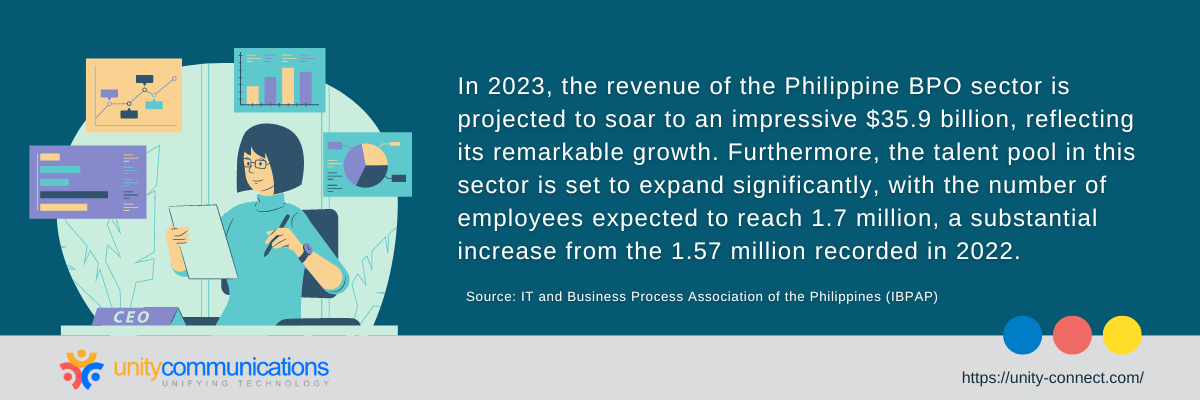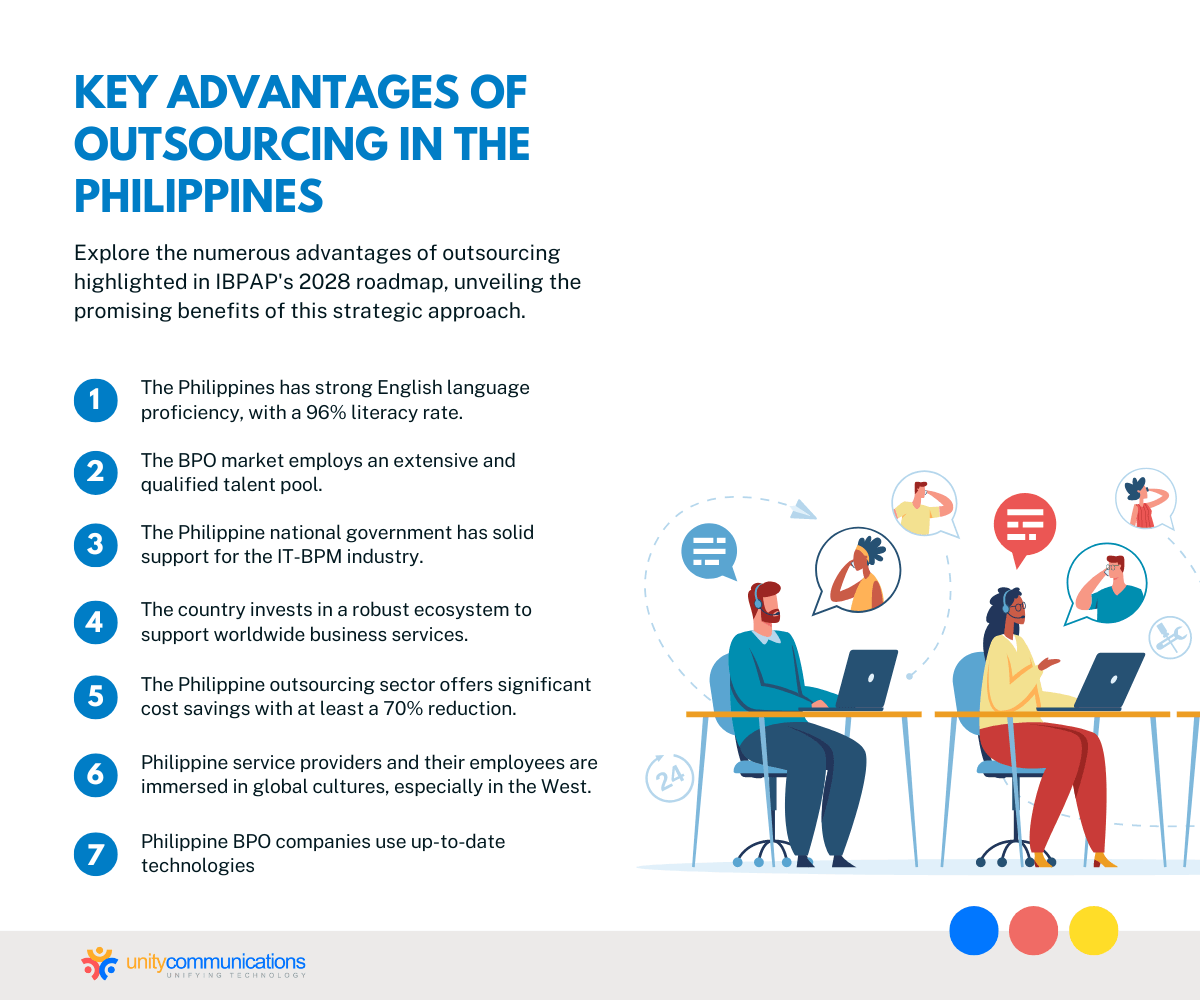Table of Contents
The Philippines has emerged as a critical player in the global business process outsourcing (BPO) market, offering various cost-effective services worldwide. The country has thus seen rapid growth over the years. In 2022 alone, the sector’s revenue increased by more than 10% to $32.5 billion.
As the country is a premier offshore outsourcing destination, knowing what the Philippine BPO industry is and where it is headed is important. The insights help enhance deals and negotiations with Filipino providers. Such data also indicates whether outsourcing to the country is ideal in the long run.
Continue reading to learn more.
What Is the Philippine BPO Industry?
The BPO sector in the Philippines has become one of the top outsourcing destinations globally because of its affordable, high-quality services. Its large pool of educated and English-speaking professionals attracts many businesses to delegate the following non-core functions to the country:
- Customer service
- Accounting and payment processing
- Data entry and analysis
- Information technology (IT) support
- E-commerce and order fulfillment support
- Supply chain management
- Cloud services
- Creatives, sales, and marketing
- Manufacturing and logistics
- Knowledge and legal processing
- Healthcare support
- Human resources (HR) assistance
Moreover, Filipino BPO vendors use advanced solutions and technologies to quickly and effectively accomplish such tasks. The Filipino workforce’s ability to easily adapt to changing consumer demands and industry shifts allows clients to prioritize their core business functions.
Due to the benefits of business process outsourcing, the country’s BPO sector has seen accelerated and continued expansion. The IT and Business Process Association of the Philippines (IBPAP) reported that the market’s revenue grew by 10.3% to $32.5 billion in 2022. IBPAP cited growth drivers in finance, healthcare, retail, tech, and telecommunications.
What Is the Philippine BPO Industry’s Future?

The Philippine BPO sector constantly evolves. IBPAP expects the market to reach $35.9 billion in revenue in 2023. The organization also projects the BPO talent pool to expand to 1.7 million employees in 2023 from 1.57 million in 2022.
Based on the association’s research results, cost savings will remain the main reason for contracting a BPO company from the Philippines. The sectors listed below will become the primary sources of BPO investments in the Southeast Asian archipelago.
- Contact and call center
- Healthcare
- Internet service
- IT assistance
- Cybersecurity
- Financial technology
- Shared service
IBPAP also stated that 83% of Philippine BPO providers anticipate growth in 2023, despite a possible global recession. The organization adds that Cebu and Davao will remain leading IT-business process management (IT-BPM) hubs this year.
Furthermore, the following local laws and initiatives will continue to strengthen the country’s position worldwide as a preeminent outsourcing nation:
- The Department of Information and Communications Technology (DICT) Act of 2015 ensures high-quality, cost-effective ICT support services.
- The Data Privacy Act of 2012 monitors and necessitates compliance with international data security requirements and standards.
- The Special Economic Zone Act provides tax incentives and exemptions for BPO companies operating in selected areas.
- The Telecommuting Act supports flexible work arrangements in the country and fosters technological advances in improving remote work.
- The continued expansion of BPO centers of excellence (CoEs) nationwide drives the industry’s growth by providing incentives such as tax holidays.
- The Next Wave Cities Program extends BPO opportunities outside Metro Manila, ensuring lower operating costs.
- The Philippine government supports BPO talent development and training programs.
Critical Philippine BPO Challenges To Overcome
As you explore what BPO is in the Philippines, note that the sector encounters challenges that hinder its consistent growth. If left unresolved, these risks weaken the market’s reliability and reputation for providing superior outsourced work.
IBPAP’s Philippine IT-BPM Industry Roadmap 2028 states the following as critical talent-related challenges the country needs to overcome:
- Insufficient number of skilled workers for higher-order niche job positions
- Low job-readiness of graduates across education levels
- Mismatched educational curriculum programs and industry needs
- Limited prospects for upskilling and reskilling
- Low basic education proficiency and digital literacy
- Minimal awareness about IT-BPM career options and growth prospects
5-year Vision for the Philippine BPO Market
What is IBPAP’s five-year vision for the Philippine BPO industry despite those challenges?
IBPAP forecasts the country to become a leading global experience center for digitally enabled and customer-centric services. The association expects the local outsourcing sector to achieve $59 billion in annual revenue by 2028, increasing the workforce to 2.5 million jobs.
The organization recommends the following strategic priorities for the IT-BPM sector to attain such objectives:
- Enable deeper service penetration within existing types of BPO segments.
- Invest in relatively newer services and segments.
- Establish volume in the current dominant buyer geographies.
- Boost share in relatively under-penetrated locations.
- Prioritize upskilling and reskilling, especially domain, technical, and soft skills.
- Back up and strengthen the innovation ecosystem.
- Catalyze the digital transformation agenda.
- Speed up the maturity of global in-house centers (GICs).
- Add 2.7 million indirect IT-BPM jobs for the country.
- Increase the contribution to gross domestic product (GDP).
- Open 54% of new jobs outside Metro Manila.
- Drive holistic and inclusive economic and social growth.
- Accelerate the environmental, social, and governance (ESG) agenda.
Is Long-term Outsourcing to the Philippines Ideal?

Absolutely. Considering the current market position and the five-year strategic plan of the Philippine BPO industry, it is safe to assert that long-term outsourcing to this country is highly advantageous. While taking various factors into account is prudent, the statistics mentioned above illustrate the capability of the sector to meet your business needs.
Whether you require inbound and outbound BPO customer support, technical assistance, or other services, you can anticipate experiencing the following key benefits outlined in IBPAP’s 2028 roadmap:
- Strong English language proficiency. The Philippines boasts robust English language proficiency, with a remarkable 96% literacy rate, making it one of the most English-proficient nations in Asia.
- Abundant and qualified talent pool. The BPO market in the Philippines boasts an extensive and well-qualified talent pool, with annual records of 850,000 college graduates, 4.4 million enrollees, and 2,400 higher education institutions nationwide.
- Government support. The Philippine national government demonstrates unwavering support for the IT-BPM industry, implementing relevant laws and programs to bolster its growth.
- Infrastructure investment. The country invests in a robust ecosystem to facilitate global business services, including high-quality real estate, digital city initiatives, and telecom infrastructure enhancements.
- Cost savings. Philippine outsourcing offers significant cost advantages. According to IBPAP’s research, businesses can achieve a minimum of 70% cost reduction when outsourcing to the Philippines compared to the United States and Europe.
- Cultural affinity. Philippine service providers and their employees are culturally attuned to global practices, particularly in Western countries. This cultural alignment enables them to deliver natural and personalized services to client organizations and customers.
- Technological advancements. Philippine BPO companies leverage cutting-edge technologies, such as artificial intelligence (AI), automation, and cloud computing, to enhance efficiency and accuracy in accomplishing various tasks.
The Bottom Line

When someone asks, “What is the Philippine BPO industry?”
Immediately answer them: It is a global leader delivering streamlined, cost-effective outsourcing services. Considering its skilled professionals, advanced solutions, and favorable business environments, the market has experienced significant and consistent growth.
Eventually, the archipelago’s BPO segment will experience continued expansion. Although challenges remain, ongoing digital advancements, increasing upskilling demands, and diversifying outsourcing verticals push the sector to stay agile and adaptable.
The benefits above give you confidence that investing in Philippine BPO is best for your business in the long run. Once you are ready to outsource a back- or front-office BPO function, let’s connect. Unity Communications has robust solutions and skilled employees ready to meet your daily operational needs.




